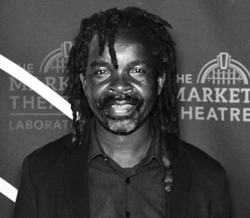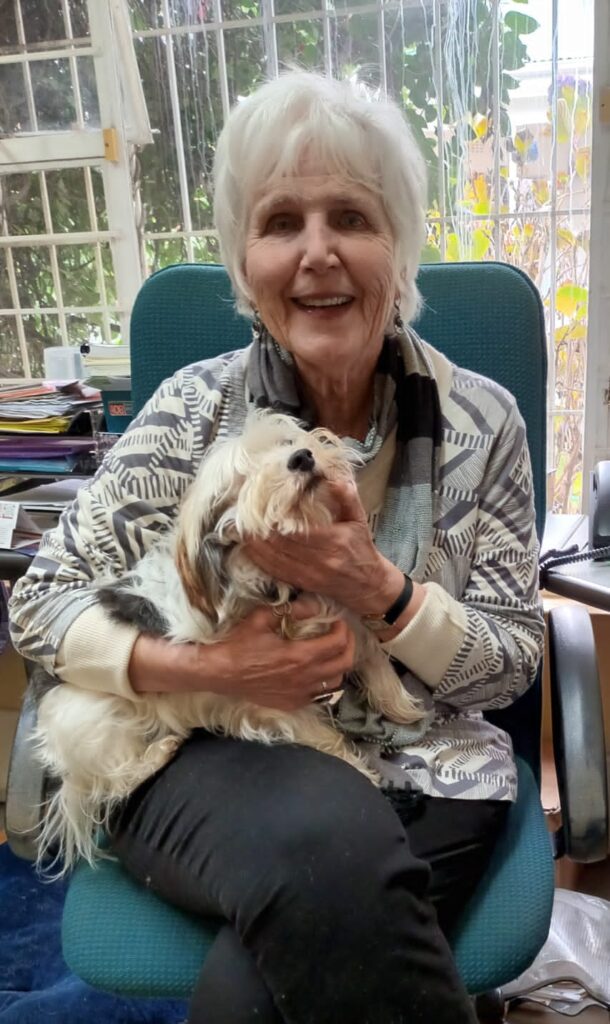The story of British violinist Rosemary Nalden who left a thriving music career in London to build a powerful music legacy in Soweto through Buskaid
By Edward Tsumele, CITYLIFE/ARTS Editor

When classical musician, violinist Rosemary left England for good in 1996 to come to South Africa, at 48, she was at the height of her classical music career. She was regularly scheduled in concerts, performing with leading orchestras in the UK. Friends and family therefore must have thought that she was crazy to make such a bold decision for an uncertain future in Africa. After all it was only five years earlier that South Africa had just started its slow and difficult journey of emerging from racial tension. Then South Africa was a country that had just come out of the ruins of a fractured society that had pretence of a nation, trying to stitch together a new society that promised to unite all races and form a united democratic nation.
Though by 1996, the country was on a positive trajectory that promised a future of opportunity, growth and tolerance of cultural differences and accommodation for diversity, anything could still go wrong despite the hope for the best. Indeed there was a certain level of certainty and hope hanging in the air, particularly among South Africans. The country had just won the Rugby World Cup the previous year in 1995, the economy was growing at a decent rate and the adjective Rainbow Nation was on the lips of many. However some reasonable levels of doubts must have lingered about the country among many, especially those looking in from outside.

And indeed South Africans citizens’ sense of hope may have been clouded by the cloud of euphoria that had exploded in 1994, with the peaceful democratic elections that saw a leader of Nelson Mandela’s stature and superior political insight become the President of a free South Africa, a reasonable outsider comfortable in their own country would however reasonably be hesitate to migrate to the country. With a career that had taken off big time, performing with the best of the best in London’s classical music circles at the time, such was the position Rosemary was in at the time in England. In fact she could be excused If she had decided to hold back for a little beat until the path the country was taking was realistically clearer, before taking that blind plunge of faith in her decision.
But she did not. She packed her bags and flew to Jan Smut International Airport, as OR Tambo International Airport was called then, and this time for an indefinite period. That trip was unlike the short visits she had been taking since 199. This time, she flew to shepherd Buskaid Soweto String Ensemble, a classical music outfit that emerged out of Diepkloof, Soweto, from close range, so to speak.
Prior Rosemary in fact for years had played the role of the chief patron, fundraiser and cheerleader in London’s corridors of power. She lobbied those with funds to assist Buskaid financially.
From as early as 1992, Rosemary had been working hard to procure sponsorship from well wishers in the UK for this outfit, not an easy job by all accounts as at the time she was a full-time musician performing with leading English orchestras, travelling throughout the world. In fact her career as a performing artist was thriving.
“At that time I was part of a close knit London circle of musicians (elite) that practiced what is called Historically Informed Performance Practice. Basically this group of musicians play instruments in a unique way, such as how the instruments would have been performed when for example Bach or Mozart composed the music, way back in centuries,” Rosemary told CITYLIFE/ARTS at Buskaid’s offices in Park Town North in an interview recently. She was speaking ahead of Buskaid’s 25th anniversary Concert that will take place in the Linder Auditorium at the University of the Witwatersrand’s Education Campus in Parktown, Johannesburg on July 17, 2022.
Indeed Rosemary did the unthinkable as she flew to Johannesburg to be at the helm of Buskaid full-time, which at the time was struggling with a number of issues related to administration, and gratefully never due to lack of talent on the part of the young musicians from Soweto, nor the lack of sponsorship. This is because Rosemary since 1992, had made sure that those in a position opened not only their hearts, but their pockets too, to make sure that the dreams of the members of Buskaid demonstrated to the world that although they came from socially and economically depressed backgrounds, they too could handle a Bach or a Mozart with flair and skill.
“Of course it was not an easy decision especially because it meant that I would from then onwards lose out on the London orchestral performance circuit as I would not be available regularly, only performing intermittently as over the years I had to travel between Johannesburg and London whenever I was scheduled to perform. But the situation with Buskaid needed me to be here on the ground permanently,” she shared.
And indeed her presence put the classical music outfit back on track, and the success Buskaid has enjoyed in the past 25 years, having so far held over 26 performances internationally, attests to that.
“When I first came here in 1992, the thought that I would be here for 25 years at some stage in my life never crossed my mind. But when I reached that decision in 1996, it was so intentional that I even rented my flat in London, to assist with some of the costs for running Baskaid.
I remember over the years that each time that I travelled to London to perform, I had to stay with friends because my own flat was not available as it was rented out to someone else. It has been like that for years now as I continued to perform in London with my last performance having been in 2008, If I remember well. However in recent years the performances have somehow slowed down, and one of the reasons is that there are now young people coming up and are rightly given an opportunity as well” she said.
But besides those personal sacrifices Rosemary had to make in order to assist members of Buskaid to reach the classical music heights that they now enjoy internationally, there seems to be no regret in Rosemary’s voice.
“Well, sometimes I think about what would have happened to my life had I not moved here. For example, would I have met a man and had children of my own even though I foster other children who have their own families?”
What is obvious in this journey travelled by the 78 year old musician, whose age does not seem to be aligned to her current state of fitness, is that she is living her dream. In effect the transformation she has made in the lives of the members of Buskaid, stands out as one of the most inspiring stories in post Apartheid South Africa’s cultural landscape. This probably explains why Rosemary is so energetic for a 78 year old to an extent that people of her age must be feeling envious of her.
The role that she played in the shepherding of this Diepkloof, Soweto , basedclassical music outfit, to become a powerful ensemble whose tentacles of influence extends from Soweto to Vienna, London, Italy, Germany, The Netherlands, Ireland, South America, New Zealand, Botswana to Syria, has transformed both Rosemary’s life and that of the members of Buskaid equally in a big way.
Today some of the products of Buskaid are to be found at prestigious music schools throughout the world, getting superior music education, while some for example Samson Diamond, are academics imparting their knowledge to young people at universities. And yet others are to be found throughout the world performing with leading orchestras.
Personally, Rosemary through her teaching and guiding Buskaid members at their Diepkloof, based, built for purpose orchestral school, stands out as one of the most culturally informed white person in South Africa. This is because over the years, she has been driving in and out of Soweto as If it is a normal every day thing that a typical white person does. In the South African context of a historically racially divided society, going as far as the spatial planning realm, the music teacher must be one of a few brave white South Africans who are as free in the bustling streets of Soweto as they are in mainly individualistic suburban environments where the majority of whites live.
“Over the many years of travelling in and out of Soweto to teach, I have come to conclude that besides their problems of crime, and the madness that one these days notices around Bara, the people who live in Soweto, and certainly other townships are vibrant and living their lives fully. They live really, and not the often inward looking suburbs where neighbours never interact with each other. Unlike in the townships, there is no sense of community in the suburbs,” she reflected.
And through her work with Buskaid all whose members are employed full-time, complete with a salary, Rosemary is more than a teacher, especially because some of the kids that end up at Buskaid come from socially challenging backgrounds in the townships. And working with young people from such a social context, challenges that have nothing to do with music are bound to come up among them.
“I am more than a teacher to them as I am also their employer, their mother and their grandmother, and these roles are not always aligned. And yes some of them deal with social challenges from their homes and they bring all those challenges to Buskaid. But what we have managed to do is that for some of them, we have managed to channel them in the right direction. Some of the reasons why these kids from troubled social backgrounds sometimes behave in a self-destructive manner is simply because they have the creative juice that has no outlet. And yes, some of the kids we end up with are so talented, but unfortunately they discover us too late that it is sometimes difficult to turn their lives around,” she said.
And so in a way, the story of Buskaid’s steady climb onto the global stages of classical music performance is very much linked to that of its director Rosemary.
And for her efforts, she has over the years received accolades and honours, and today at the end of her name you will notice the intials MBE, (Member of the British Empire), having been honoured by the Queen of England. And of course her role in Buskaid must have played an important part in the Queen Elizabeth’s consideration for this bestowing this prestigious title on Rosemary.











Rosemary Nalden has produced the most excellent players over the years from Samson Diamond onwards. As a former professional orchestral violinist myself I have always had the utmost admiration for her & her players. Glynis Rix